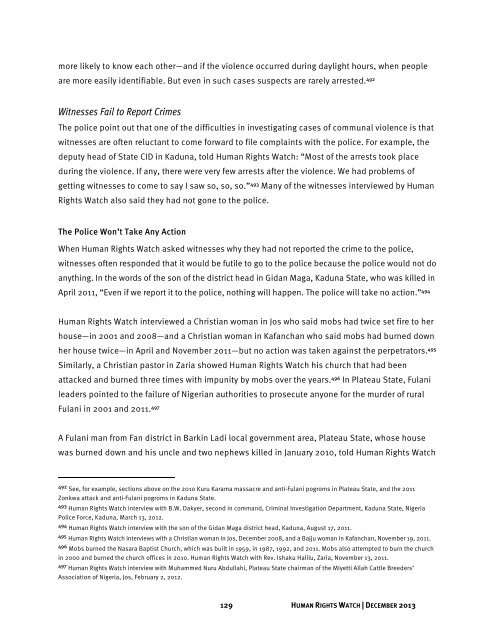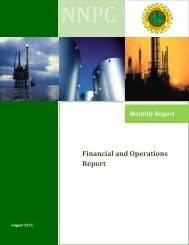Create successful ePaper yourself
Turn your PDF publications into a flip-book with our unique Google optimized e-Paper software.
more likely to know each other—and if the violence occurred during daylight hours, when people<br />
are more easily identifiable. But even in such cases suspects are rarely arrested. 492<br />
Witnesses Fail to Report Crimes<br />
The police point out that one of the difficulties in investigating cases of communal violence is that<br />
witnesses are often reluctant to come forward to file complaints with the police. For example, the<br />
deputy head of State CID in Kaduna, told Human Rights Watch: “Most of the arrests took place<br />
during the violence. If any, there were very few arrests after the violence. We had problems of<br />
getting witnesses to come to say I saw so, so, so.” 493 Many of the witnesses interviewed by Human<br />
Rights Watch also said they had not gone to the police.<br />
The Police Won’t Take Any Action<br />
When Human Rights Watch asked witnesses why they had not reported the crime to the police,<br />
witnesses often responded that it would be futile to go to the police because the police would not do<br />
anything. In the words of the son of the district head in Gidan Maga, Kaduna State, who was killed in<br />
April 2011, “Even if we report it to the police, nothing will happen. The police will take no action.” 494<br />
Human Rights Watch interviewed a Christian woman in Jos who said mobs had twice set fire to her<br />
house—in 2001 and 2008—and a Christian woman in Kafanchan who said mobs had burned down<br />
her house twice—in April and November 2011—but no action was taken against the perpetrators. 495<br />
Similarly, a Christian pastor in Zaria showed Human Rights Watch his church that had been<br />
attacked and burned three times with impunity by mobs over the years. 496 In Plateau State, Fulani<br />
leaders pointed to the failure of Nigerian authorities to prosecute anyone for the murder of rural<br />
Fulani in 2001 and 2011. 497<br />
A Fulani man from Fan district in Barkin Ladi local government area, Plateau State, whose house<br />
was burned down and his uncle and two nephews killed in January 2010, told Human Rights Watch<br />
492 See, for example, sections above on the 2010 Kuru Karama massacre and anti-Fulani pogroms in Plateau State, and the 2011<br />
Zonkwa attack and anti-Fulani pogroms in Kaduna State.<br />
493 Human Rights Watch interview with B.W. Dakyer, second in command, Criminal Investigation Department, Kaduna State, Nigeria<br />
Police Force, Kaduna, March 13, 2012.<br />
494 Human Rights Watch interview with the son of the Gidan Maga district head, Kaduna, August 17, 2011.<br />
495 Human Rights Watch interviews with a Christian woman in Jos, December 2008, and a Bajju woman in Kafanchan, November 19, 2011.<br />
496 Mobs burned the Nasara Baptist Church, which was built in 1959, in 1987, 1992, and 2011. Mobs also attempted to burn the church<br />
in 2000 and burned the church offices in 2010. Human Rights Watch with Rev. Ishaku Halilu, Zaria, November 13, 2011.<br />
497 Human Rights Watch interview with Muhammed Nuru Abdullahi, Plateau State chairman of the Miyetti Allah Cattle Breeders’<br />
Association of Nigeria, Jos, February 2, 2012.<br />
129 HUMAN RIGHTS WATCH | DECEMBER 2013




